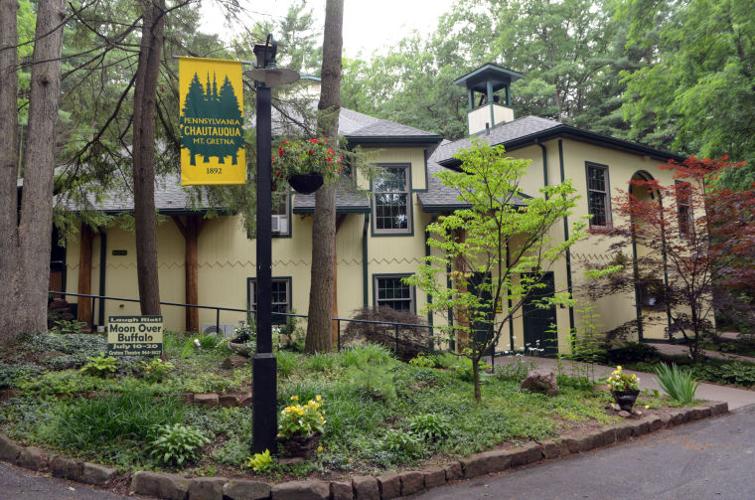The Scribbler spent Independence Day in Mount Gretna, the charming Lebanon County community that everyone loves to visit and some lucky few call home. From swimming in Lake Conewago in the afternoon to listening to the 58th annual patriotic concert at the Mount Gretna Playhouse in the evening, it was an all-Mount Gretna day.
Total immersion in the community included a midday reading of Tom Meredith’s new book, “Two for the Woods: Mount Gretna, How It Got This Way.” The 125-page, beautifully illustrated book about Chautauqua and Campmeeting — Mount Gretna’s two main communities — has been published as part of the community’s 125th anniversary celebration.
Meredith’s engaging prose will tell you, among other things, that:
— Mrs. Hugh Maxwell, wife of the treasurer of the Cornwall and Lebanon Railroad (transformed into a popular rail trail just north of Mount Gretna), named the place for her home in Gretna, Scotland.
— The Mount Gretna Roller Rink, still a popular attraction in all kinds of weather, is the community’s oldest building. It was the original exhibit hall for the Farmers Encampment, also started 125 years ago and the forerunner of the Pennsylvania Farm Show.
— William Ulrich, a state legislator who lived in Hummelstown and was active in both Chautauqua and Campmeeting, is credited with determining that all Chautauqua lots would be larger than those in Campmeeting.
Meredith describes the beginnings of the Pennsylvania Chautauqua and the Mount Gretna Campmeeting Association, established by the United Brethren Church. Pinch Road always has divided Mount Gretna’s two main summer communities.
“Separated by a dusty wagon track that climbed over a pinch in the South Mountain,” Meredith writes, Chautauqua and Campmeeting “each provided the same sylvan attractions to hot and weary city dwellers — cool, shady areas, gentle breezes, quiet days and nights — for cultural improvement and seclusion for worship.”
The communities grew quickly. Members of the Campmeeting Association built cottages and a chapel and devoted themselves to worship. Members of Chautauqua, following the example of the “Mother Chautauqua” in New York, rooted their summer offerings in four areas — art, religion, culture and education — and buildings to accommodate them.
The basic recipe for both communities never changed, even as Campmeeting raised a tabernacle at its core, and Chautauqua formalized its early courses by creating a summer stock theater, annual art show, Music at Gretna and other cultural programs.
Offering a full summer schedule in both places requires a massive organizational effort. Meredith pays tribute to the volunteers who, since 1892, “have been at the heart of the success of both the Campmeeting and Chautauqua experiments.”
It’s not likely that anyone will argue with Meredith’s conclusion that the Playhouse and the Jigger Shop (an ice cream shop with roots before 1900) create “the most enduring impressions” for Mount Gretna’s casual visitors.
But those who live in Gretna and those who visit also enjoy many more special places: the lake and its beach, the cool grove of trees near the Hall of Philosophy, narrow paths among cottages that beckon strollers on a perfect early summer day.
Some people believe Mount Gretna is much more than the sum of its parts. Meredith says those people call it “a spirit, not a place.”
The author based much of his book on the successful applications for the Pennsylvania Chautauqua and Campmeeting to the National Register of Historic Places.
Copies of “Two for the Woods” can be obtained by visiting the Mount Gretna Area Historical Society, calling the society at 717-964-1105 or emailing info@mtgretnahistory.org. Cost is $20 for society members and $25 for nonmembers. Add $3 for mailing. Write to Mount Gretna Area Historical Society, P.O. Box 362, Mount Gretna, PA 17064. All proceeds go to the historical society.
Jack Brubaker, a retired LNP staff writer, writes “The Scribbler” column; it appears Wednesdays. He welcomes comments and contributions at scribblerlnp@gmail.com.











